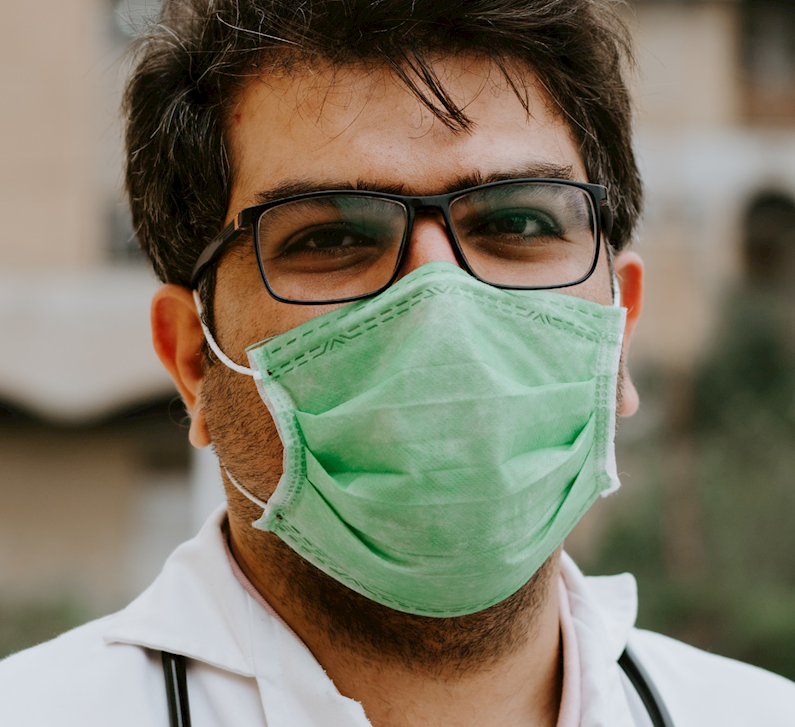
COVID-19 Burial Support Line
Help, advice and support for Muslim burials
0115 970 3332
Open Monday-Sunday 9AM-4PMThe Prophet (saw) said, ‘Plague is the cause of martyrdom for every Muslim (who dies because of it).’ [Bukhari]
The Coronavirus crisis has caused concern and confusion regarding proper burial procedures and methods for Muslims.
Our new support line will help to answer and clarify any questions and queries you may have, in line with National Burial Council and Sharia guidelines.
Headed by our in-house mufti, Mufti Muhammad Ismail, we can also direct you to local Muslim burial councils who will be able to help you in your area.
Finally, for anyone who has suffered the loss of a loved one recently, we pray Allah showers them in His mercy and forgiveness.

PPE Support
We are also providing personal protective equipment (PPE) to Muslim Burial Councils and Funeral Services. The equipment includes a Hazmat suit, visor, foot covers and N95 mask, enough to protect a team of five per locality, catering to the deceased body.
We have been fortunate to have access to this scarce resource and are working hard to deliver it to those within the funeral industry who are in urgent need of it. To find out if you are eligible for PPE support, fill in this form.
Apply for PPEFAQs
- Q. How do we deal with the body of a person who dies from the Coronavirus?
- Q. What personal protective equipment (PPE) is needed for the person who is handling the body?
- Q. What is the advisable Ghusl process?
- Q. Can we shroud the body before placing it into the coffin?
- Q. What actions would increase the risk of transmission when performing ghusl?
- Q. Is Tayammum (dry ablution) allowed instead of ghusl?
- Q. What is the advice for the funeral prayer and burial process?
- Q. Is it allowed to cremate the body of a Muslim who dies of the Coronavirus?
A. When a person with COVID-19 dies in hospital, the doctor will issue the death certificate. The deceased will be placed within a body bag and conveyed to the mortuary by the mortuary staff only.
If that person dies at home, then the funeral director will contact the coroner to determine the cause of death. The body will be moved to the hospital mortuary so that the coroner can carry out the test. This could take a couple of days. The body during this time unfortunately will not be accessible to the family.
A. PPE required is a full sleeve plastic gown, gloves, a fluid resistant surgical mask and a visor. If the body isn’t exposed to human contact after the ghusl (e.g. in a body bag covered by a burial shroud) then PPE may not be necessary at the burial site.
A. The Funeral Director with PPE will collect the body from the hospital. The trained staff (brothers for the deceased male and sisters for the deceased female) wearing PPE can carry out the ghusl process ensuring the dignity and respect of the deceased at all times. No one over the age of 60 should take part in the process. All areas should be disinfected thoroughly with the appropriate chemicals afterwards.
A. The body will be placed in a body bag and then into a coffin. It can be shrouded over the bag if possible. The coffin will be wiped down with appropriate disinfectants for handling. The coffin will be taken to the cemetery where the Janazah prayer will be performed. The number of people who can attend the prayer may be limited by the local council.
A. Any actions that lead to an aerosol spray or splash such as the use of a shower spray or unnecessarily vigorous manipulation of the body. In such cases, the ghusl becomes high risk and we advise not to proceed.
A. Tayammum means to seek dry purification using purified sand or dust, which may be performed in place of washing (ghusl) but this situation does not require Tayammum. The best advice in this case is to do Masah, i.e. running the wet hands over the body bag and that can be better achieved with a spray bottle all around the body bag.
A. The congregation for the Janazah Prayer should be led by an Imam and should stand two metres apart - hand shaking or hugs will not be permitted due to the possibility of transmitting the virus, which could lead to more deaths. The burial should be according to Islamic practices. If any family member was in contact with the deceased, they and their family may not be allowed to attend the Janazah prayer.
A. In all schools of thought in Islam, cremation is not an option at all. On 23rd March 2020, the UK Government has legally committed to respect the religious wishes of individuals who pass away due to the Coronavirus in terms of burial rites, which means there are no prohibitions on burial at all, therefore cremations are absolutely not allowed.

Established in 1993, Muslim Hands is an aid agency and NGO helping those affected by poverty, conflict and natural disaster in over 20 countries worldwide.



